Module 11 Unit 2 Here are some ways to welcome them. 单词讲解 课件(21张PPT,内嵌音频)
文档属性
| 名称 | Module 11 Unit 2 Here are some ways to welcome them. 单词讲解 课件(21张PPT,内嵌音频) | 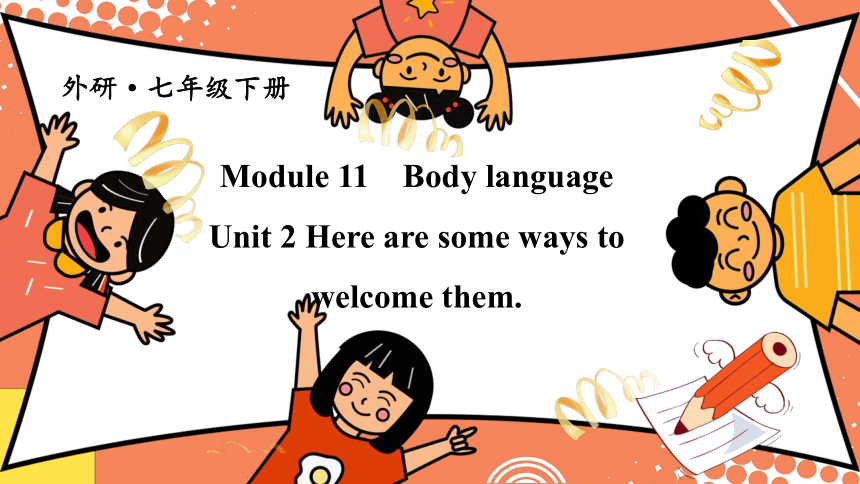 | |
| 格式 | pptx | ||
| 文件大小 | 12.1MB | ||
| 资源类型 | 教案 | ||
| 版本资源 | 外研版 | ||
| 科目 | 英语 | ||
| 更新时间 | 2021-12-26 13:37:11 | ||
图片预览

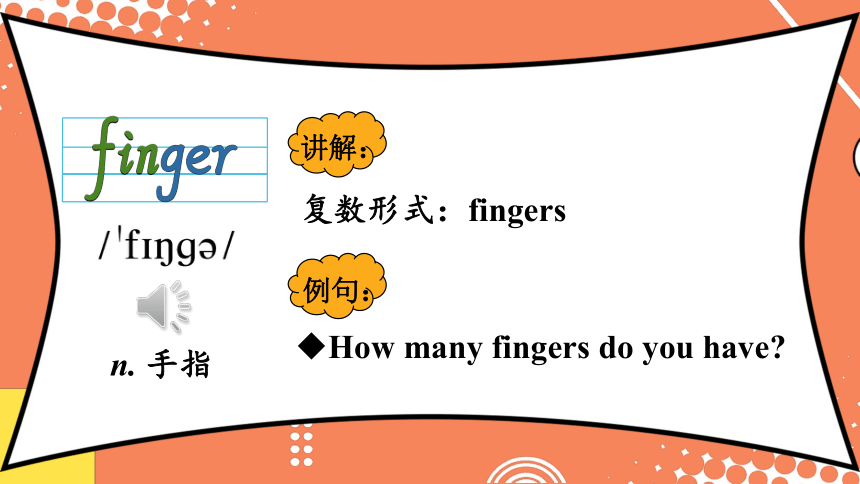
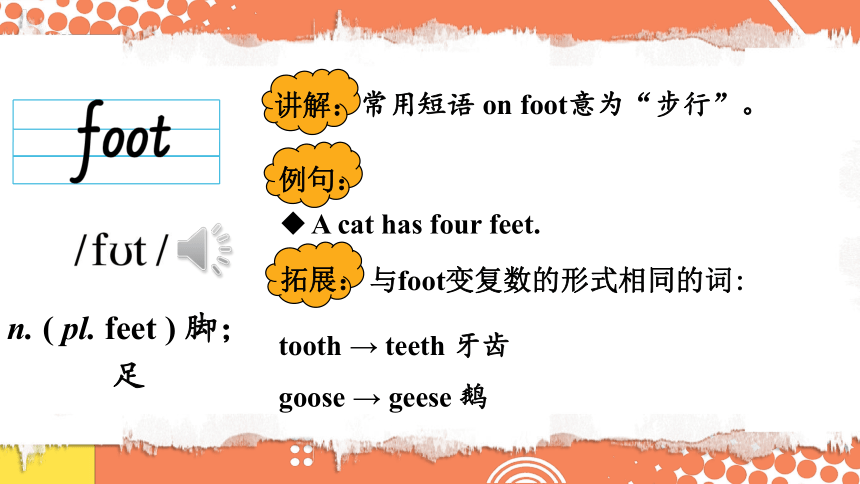
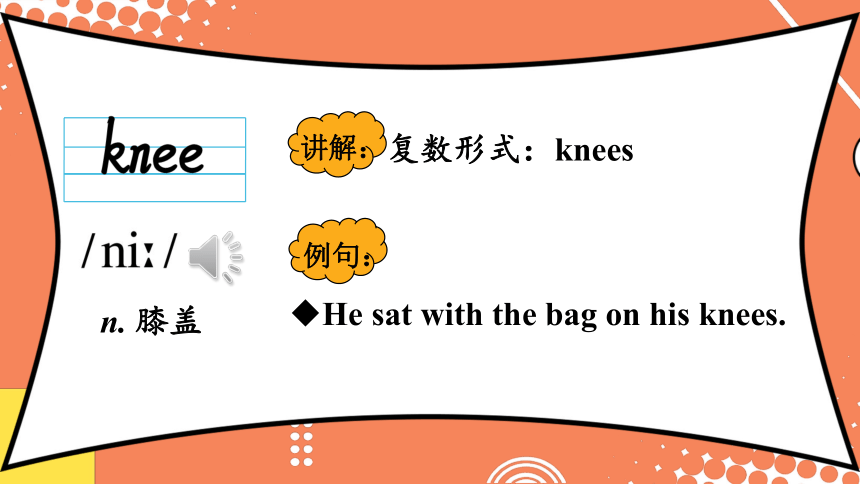
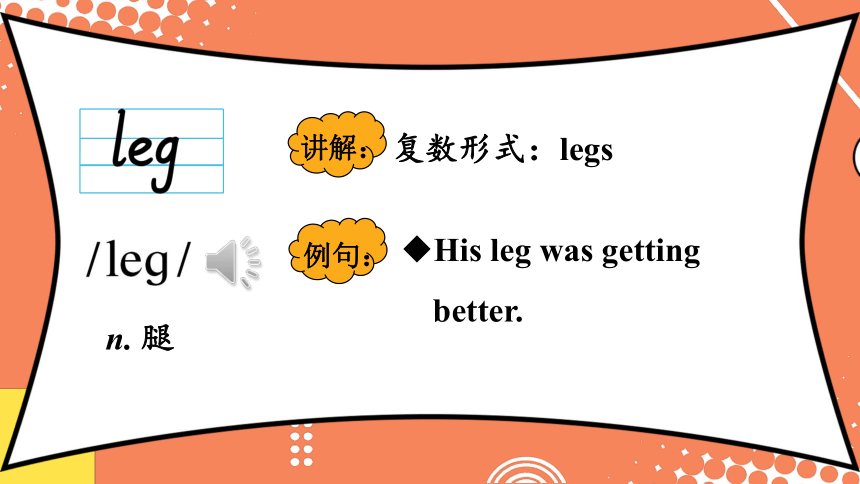
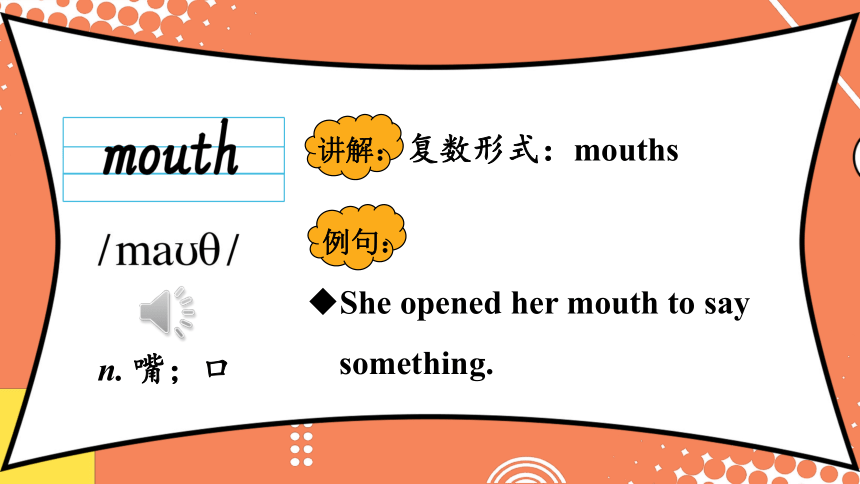
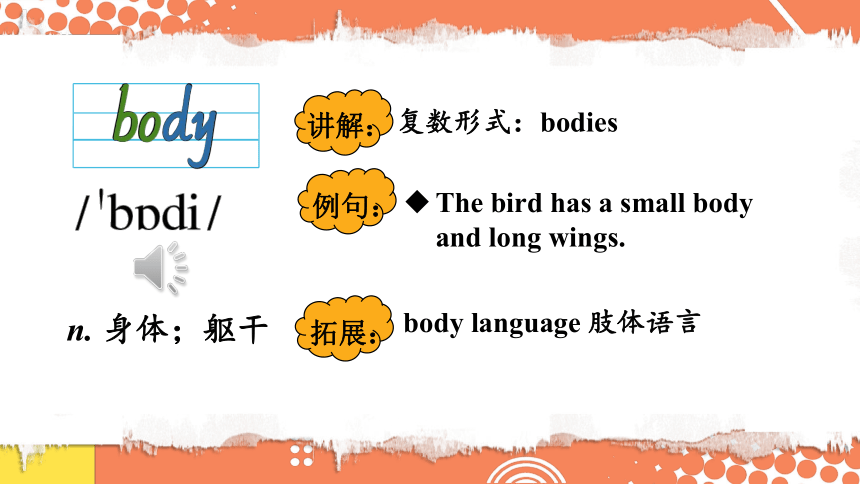
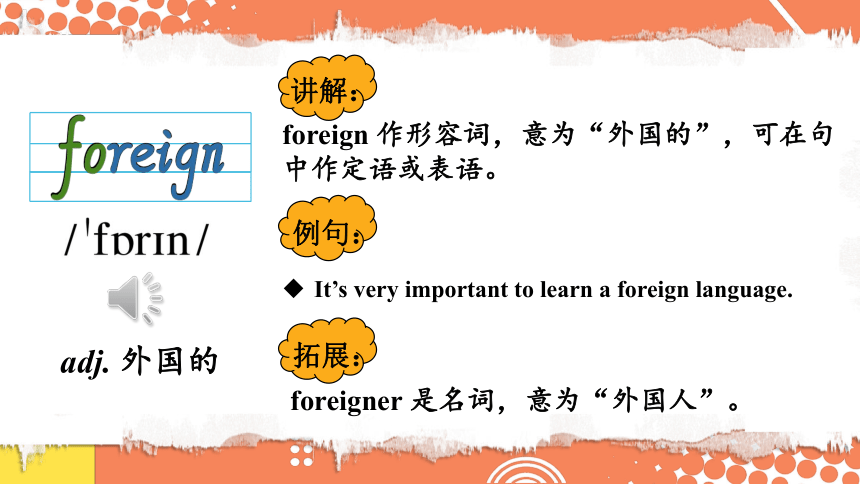
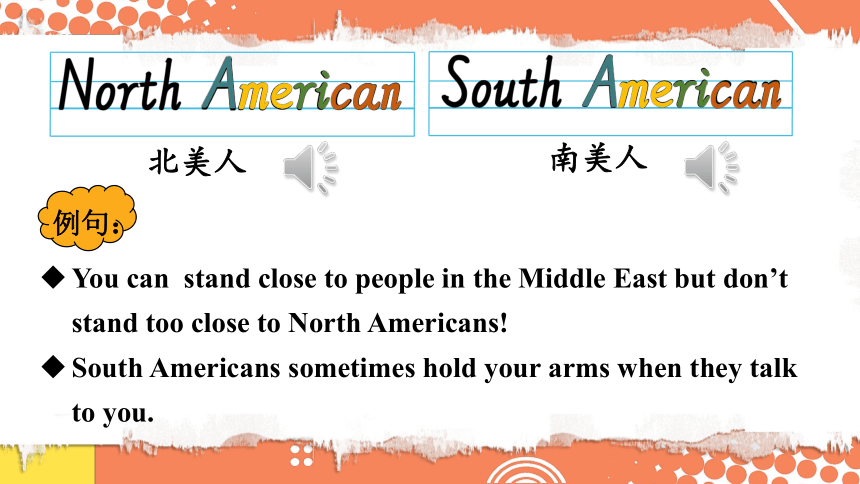
文档简介
(共21张PPT,内嵌音频)
Module 11 Body language
Unit 2 Here are some ways to
welcome them.
外研·七年级下册
复数形式:fingers
How many fingers do you have
讲解:
例句:
n. 手指
n. ( pl. feet ) 脚;足
常用短语 on foot意为“步行”。
A cat has four feet.
与foot变复数的形式相同的词:
tooth → teeth 牙齿
goose → geese 鹅
讲解:
例句:
拓展:
n. 膝盖
复数形式:knees
He sat with the bag on his knees.
讲解:
例句:
n. 腿
复数形式:legs
His leg was getting better.
讲解:
例句:
复数形式:mouths
She opened her mouth to say something.
n. 嘴;口
讲解:
例句:
复数形式:bodies
The bird has a small body and long wings.
n. 身体;躯干
body language 肢体语言
讲解:
例句:
拓展:
foreign 作形容词,意为“外国的”,可在句中作定语或表语。
It’s very important to learn a foreign language.
foreigner 是名词,意为“外国人”。
adj. 外国的
讲解:
例句:
拓展:
You can stand close to people in the Middle East but don’t stand too close to North Americans!
South Americans sometimes hold your arms when they talk to you.
北美人
南美人
例句:
personal作形容词,意为“个人的”,由“person( n. 人)+ -al(形容词后缀)”构成,常作定语。
Don’t share your personal information with anyone.
adj. 个人的
讲解:
例句:
The two students are walking arm in arm on the bridge.
arm in arm意为“臂挽臂地”,由“身体部位类名词+介词+同一身体部位类名词”构成。
n. 臂;手臂
臂挽臂地
hand in hand 手拉手地 face to face 面对面地
shoulder to shoulder 肩并肩地 heart to heart 心连心地
讲解:
例句:
拓展:
过去式:held
The girl held her father’s hand and nodded her head.
hold还可意为“召开;举行;容纳”。
In 2022, China will hold the 24th Winter Olympics in Beijing.
v. 握着;使不动
讲解:
例句:
拓展:
move away意为“移动;离开”。
Don’t move. Be careful with the dog.
She lived alone after her daughter moved away.
v. 移动
讲解:
例句:
In Britain many people don’t like other people to touch them at all.
British adj. 英国的;英国人的
不列颠;英国
例句:
拓展:
I don’t worry about him at all.
not at all意为“一点也不”,用来表示否定。
一点也不
not at all还可意为“没关系;别客气”,用来回答道歉或表示感谢的话。
—I’m sorry to trouble you. —Not at all.
讲解:
例句:
拓展:
反义词:impolite/rude
be polite to sb. 对某人有礼貌
It’s (not) polite to do sth.做某事是(不)礼貌的。
We should be polite to the elderly.
polite的相关词:
politely adv. 礼貌地 impolite adj. 不礼貌的 impolitely adv. 不礼貌地
adj. 礼貌的
讲解:
例句:
拓展:
通常用于肯定句中,在否定句或疑问句中要用anywhere。形容词修饰somewhere, anywhere等时,应置于其后。
This weekend we want to go somewhere interesting.
adv. 某处;某个地方
讲解:
例句:
wave作不及物动词,意为“挥(手);招(手);摆(手)”。wave to/at sb.意为“向某人挥手”。
The people on the bus waved and we waved back.
wave还可作及物动词,意为“挥舞;挥动”。
People are waving hands and cheering.
v. 挥(手);招(手);摆(手)
讲解:
例句:
拓展:
My birthday isn’t in September. In fact, it’s in
October.
fact作可数名词,意为“事实;细节”。
in fact意为“事实上”,一般位于句首。
n. 事实;细节
事实上
讲解:
例句:
反义词:polite
be rude to sb.意为“对某人无礼/粗鲁”。
It’s rude to speak when you are eating.
Don’t be rude to others.
adj. 粗鲁的;无礼的
讲解:
例句:
过去式:brought
bring sb. sth.意为“给某人带来某物”,相当于
bring sth. for sb.。
bring, take与get
bring:带来。指把人或物从别处带到说话人所在的地方。
take:拿去;带去。指把人或物从说话人所在的地方带去别处。
get:去取。指到某地去把人或物带来, 即一个来回。
v. 带来
讲解:
拓展:
Module 11 Body language
Unit 2 Here are some ways to
welcome them.
外研·七年级下册
复数形式:fingers
How many fingers do you have
讲解:
例句:
n. 手指
n. ( pl. feet ) 脚;足
常用短语 on foot意为“步行”。
A cat has four feet.
与foot变复数的形式相同的词:
tooth → teeth 牙齿
goose → geese 鹅
讲解:
例句:
拓展:
n. 膝盖
复数形式:knees
He sat with the bag on his knees.
讲解:
例句:
n. 腿
复数形式:legs
His leg was getting better.
讲解:
例句:
复数形式:mouths
She opened her mouth to say something.
n. 嘴;口
讲解:
例句:
复数形式:bodies
The bird has a small body and long wings.
n. 身体;躯干
body language 肢体语言
讲解:
例句:
拓展:
foreign 作形容词,意为“外国的”,可在句中作定语或表语。
It’s very important to learn a foreign language.
foreigner 是名词,意为“外国人”。
adj. 外国的
讲解:
例句:
拓展:
You can stand close to people in the Middle East but don’t stand too close to North Americans!
South Americans sometimes hold your arms when they talk to you.
北美人
南美人
例句:
personal作形容词,意为“个人的”,由“person( n. 人)+ -al(形容词后缀)”构成,常作定语。
Don’t share your personal information with anyone.
adj. 个人的
讲解:
例句:
The two students are walking arm in arm on the bridge.
arm in arm意为“臂挽臂地”,由“身体部位类名词+介词+同一身体部位类名词”构成。
n. 臂;手臂
臂挽臂地
hand in hand 手拉手地 face to face 面对面地
shoulder to shoulder 肩并肩地 heart to heart 心连心地
讲解:
例句:
拓展:
过去式:held
The girl held her father’s hand and nodded her head.
hold还可意为“召开;举行;容纳”。
In 2022, China will hold the 24th Winter Olympics in Beijing.
v. 握着;使不动
讲解:
例句:
拓展:
move away意为“移动;离开”。
Don’t move. Be careful with the dog.
She lived alone after her daughter moved away.
v. 移动
讲解:
例句:
In Britain many people don’t like other people to touch them at all.
British adj. 英国的;英国人的
不列颠;英国
例句:
拓展:
I don’t worry about him at all.
not at all意为“一点也不”,用来表示否定。
一点也不
not at all还可意为“没关系;别客气”,用来回答道歉或表示感谢的话。
—I’m sorry to trouble you. —Not at all.
讲解:
例句:
拓展:
反义词:impolite/rude
be polite to sb. 对某人有礼貌
It’s (not) polite to do sth.做某事是(不)礼貌的。
We should be polite to the elderly.
polite的相关词:
politely adv. 礼貌地 impolite adj. 不礼貌的 impolitely adv. 不礼貌地
adj. 礼貌的
讲解:
例句:
拓展:
通常用于肯定句中,在否定句或疑问句中要用anywhere。形容词修饰somewhere, anywhere等时,应置于其后。
This weekend we want to go somewhere interesting.
adv. 某处;某个地方
讲解:
例句:
wave作不及物动词,意为“挥(手);招(手);摆(手)”。wave to/at sb.意为“向某人挥手”。
The people on the bus waved and we waved back.
wave还可作及物动词,意为“挥舞;挥动”。
People are waving hands and cheering.
v. 挥(手);招(手);摆(手)
讲解:
例句:
拓展:
My birthday isn’t in September. In fact, it’s in
October.
fact作可数名词,意为“事实;细节”。
in fact意为“事实上”,一般位于句首。
n. 事实;细节
事实上
讲解:
例句:
反义词:polite
be rude to sb.意为“对某人无礼/粗鲁”。
It’s rude to speak when you are eating.
Don’t be rude to others.
adj. 粗鲁的;无礼的
讲解:
例句:
过去式:brought
bring sb. sth.意为“给某人带来某物”,相当于
bring sth. for sb.。
bring, take与get
bring:带来。指把人或物从别处带到说话人所在的地方。
take:拿去;带去。指把人或物从说话人所在的地方带去别处。
get:去取。指到某地去把人或物带来, 即一个来回。
v. 带来
讲解:
拓展:
同课章节目录
- Module 1 Lost and found
- Unit 1 Whose bag is this?
- Unit 2 Are they yours?
- Unit 3 Language in use
- Module 2 What can you do ?
- Unit 1 I can play the piano
- Unit 2 I can run really fast
- Unit 3 Language in use
- Module 3 Making plans
- Unit 1 What are you going to do at the weekends?
- Unit 2 We're going to cheer the players.
- Unit 3 Language in use
- Module 4 Life in the future
- Unit 1 Everyone will study at home
- Unit 2 Every family will have a small plane.
- Unit 3 Language in use
- Module 5 Shopping
- Unit 1 What can I do for you?
- Unit 2 You can buy everything on the Internet
- Unit 3 Language in use
- Module 6 Around town
- Unit 1 Could you tell me how to get to the Nationa
- Unit 2 The London Eye is on your right.
- Unit 3 Language in use
- Revision module A
- Module 7 My past life
- Unit 1 I was born in a small village.
- Unit 2 I was born in Quincy.
- Unit 3 Language in use
- Module 8 Story time
- Unit 1 Once upon a time….
- Unit 2 Goldilocks hurried out of the house.
- Unit 3 Language in use
- Module 9 Life history
- Unit 1 He left school and began work at the age of
- Unit 2 He decided to be an actor.
- Unit 3 Language in use
- Module 10 A holiday journey
- Unit 1 What did you do?
- Unit 2 This morning we took a walk.
- Unit 3 Language in use
- Module 11 Body language
- Unit 1 They touch noses!
- Unit 2 Here are some ways to welcome them.
- Unit 3 Language in use
- Module 12 Western music
- Unit 1 It's so beautiful!
- Unit 2 Vienna is the centre of European classical
- Unit 3 Language in use
- Revision module B
